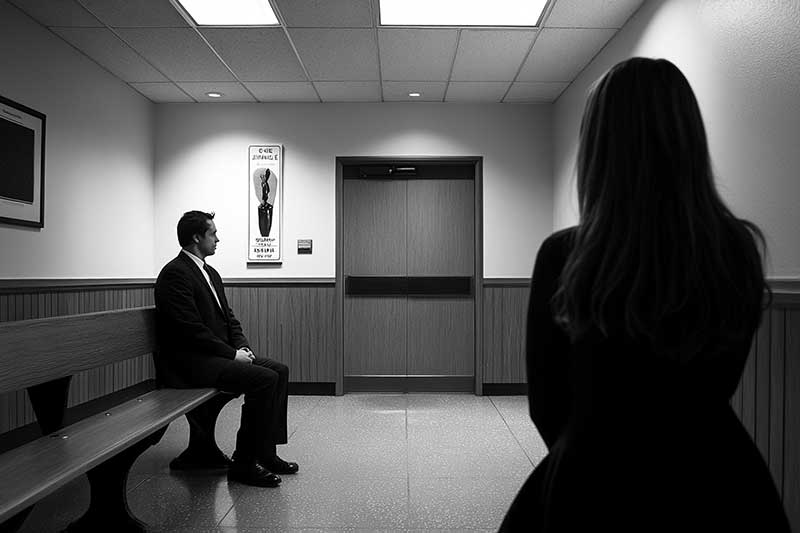Knowing how to prepare for your asylum court interview can make the difference between obtaining protection or facing removal proceedings from the US.
Clear, coherent, and well-founded testimony can make all the difference. Our Los Angeles immigration lawyers have extensive experience in asylum cases and are here to guide you every step of the way. Call us now.
LATINOS WITH OVER 50 YEARS EXPERIENCE
Tell Us Your Case
Table of Contents
How to Prepare for a Successful Asylum Court Interview in 2025
Preparing for an asylum interview before a judge requires clarity, documentation, and legal advice. Below are some things to keep in mind:
- Bring an official ID, passport, Form I-94 (if you have one), and copies of your application for asylum in the United States.
- Gather additional evidence to support your story.
- If you do not speak English, bring a competent interpreter.
- If your attorney accompanies you, be sure to file Form G-28 with USCIS. This legally authorizes your attorney to represent you in the case.
- You may request that your attorney participate remotely by filing Form G-1593 if you cannot be physically present.
What is an asylum court interview and when does it occur?
The asylum court interview is part of the defensive asylum process. In a nutshell:
- It occurs when an individual faces some type of deportation in the United States and requests asylum as a form of protection.
- It is conducted before an EOIR immigration judge.
- It differs from affirmative asylum because it is not filed with USCIS, but rather directly in court.
It’s important to note that the government will be represented by a prosecutor. Therefore, you must demonstrate that you meet the requirements for asylum.

Asylum isn’t the only form of humanitarian protection available. If you’d like to learn about similar immigration relief, we invite you to read about refugee status in the United States, another avenue for those fleeing persecution or danger in their home country.
Tips on how to prepare with your immigration attorney for your asylum interview in court
Proper preparation with your attorney can make all the difference in the outcome of your case. Some key points to discuss together:
- Practice your testimony in a clear and orderly manner, reviewing your history, important dates, and relevant facts.
- Review all previously submitted documentation to ensure there are no contradictions.
- Find out if you might also qualify for withholding of removal or protection under the Convention Against Torture (CAT).
- Identify potential weaknesses in your case and rehearse how to address them appropriately.
How to reschedule an asylum interview?
If you missed your asylum interview or need to reschedule, you can request a reschedule by following these steps:
- Send a written request to the asylum office where your interview is scheduled.
- If this is your first time, please make sure your application arrives before your interview date.
- If you have already rescheduled or request a change within 15 days of the interview, you must provide “good cause” (a valid reason, evaluated on a case-by-case basis).
- If USCIS sent the notification to the wrong address , your interview will be automatically rescheduled, without the need for justification.
What can I do if I don’t speak English for the asylum interview at court?
You have the right to a free interpreter in immigration court. However, you must notify us in advance.
Furthermore, you are not allowed to bring your own interpreter. If you notice errors in the translation during the hearing, please inform the judge immediately.

Not being fluent in English doesn’t prevent you from exercising certain immigration rights, such as applying for asylum or even citizenship. If you’re interested in learning when it’s possible to naturalize without speaking English, check out our guide: Can you become a US citizen without speaking English?
What documents should you bring to the asylum court interview?
Be sure to bring organized and complete copies of the following documentation:
Mandatory documents
- Form I-589, application for asylum.
- Notice to Appear (NTA).
- Personal letter explaining your story of persecution.
- Proof of identity (passport, birth certificate and others.).
Evidence of persecution
- Photographs of injuries, attacks, or damage to your home.
- Medical or psychological reports .
- Police reports or evidence of threats.
- News articles that corroborate your story.
Additional evidence
- Notarized letters from witnesses (relatives, neighbors, acquaintances).
- Reports from NGOs, the State Department, or UNHCR.
- Religious certificates , political affiliations, or proof of sexual orientation, if applicable.
What to do on the day of the hearing?
These practical tips can help you present yourself respectfully and confidently in court:
- Arrive early. Punctuality is essential.
- Dress formally. Avoid hats, T-shirts with slogans, or flashy clothing.
- Do not use the phone or attempt to record inside the room.
- Speak clearly and respectfully. Address the judge as “Your Honor.”
- Don’t interrupt. Wait to be given the floor to respond.
- Mind your body language. Stay calm, avoid exaggerated gestures, and don’t memorize answers.
What questions do they ask in an asylum interview?

Be prepared to answer clearly and honestly questions like:
- Why did you decide to leave your home country?
- Who chased you and what was their motive?
- Did you report these events to the police or other authorities?
- What are you afraid will happen to you if you return to your country?
- Did you enter the United States legally? On what date?
- Have you applied for asylum in any other country?
- Do you belong to any religious, political, ethnic group, or LGBTQ+ community?
Note: Changes in current immigration policies have had a particular impact on the LGBTQ+ community. If you’re interested in learning how these measures affect them, please check our blog on: Immigration Policies and LGBTQ+ Immigrants: Impact.
What common mistakes should you avoid during your asylum hearing?
Avoiding certain mistakes can protect your credibility with the judge. For example:
- Contradicting yourself when mentioning dates, places or key facts.
- Responding repeatedly with “I don’t remember.” It’s better to clearly acknowledge what you do know.
- Submit documents that have not been translated into English by a certified translator.
- Faking emotions or giving memorized answers.
- Appearing without the representation of an immigration attorney.
Note: Although the asylum process is different from the citizenship process, both require a serious presentation before an immigration officer. If you’re interested in learning how to dress for these types of formal interviews, you might be interested in our guide on how to dress for a citizenship interview.
What happens after the asylum interview?
Generally, the immigration judge can make a decision the same day or schedule an additional hearing to issue a ruling. Possible resolutions include:
- Approval of asylum.
- Denial with right to appeal to the Board of Immigration Appeals (BIA).
- Denial with the option to leave the United States voluntarily, if applicable.
- Final deportation order.
If you received voluntary departure, you may still have immigration options depending on your situation. For more details, see our article: Can you arrange papers with a voluntary departure?
Why is it so important to have legal help in an asylum case?
It’s crucial to have the help of a lawyer because obtaining asylum isn’t easy. In fact, more than 70% of applications are denied on the first attempt.
With the help of an experienced immigration attorney, you can significantly increase your chances of success.
Frequently asked questions about preparing for your asylum court interview

How to win an asylum interview?
Success in your interview depends on good legal preparation, clear testimony, and credible evidence.
Rehearse your story with your lawyer, avoid contradictions, and have your documents translated.
Why is it so important to prepare for your asylum court interview?
This is important because, during this hearing, you must demonstrate to the judge that you meet the legal requirements to obtain asylum.
It’s not just about submitting documents; the consistency of your story, your credibility, and your response will also be evaluated. Poor preparation can seriously impact your case.
What to expect at an asylum hearing?
You will have to appear before a judge, explain why you need asylum, and answer questions about your history.
There, your testimony, evidence, and credibility will be evaluated. You may bring a lawyer, and if you don’t speak English, an interpreter will be assigned to you.
What happens if I miss my asylum interview?
If you miss your asylum interview, you must submit a written explanation within 45 days.
If you don’t have legal status, your case will be sent to immigration court. If you have valid status, USCIS may administratively close your case.
How can our attorneys help you prepare for your asylum court interview?
As we’ve seen, good preparation is key to protecting your future in the United States.
Our attorneys, David and Ramiro Lluis, help you organize your case, practice your testimony, gather solid evidence, and anticipate difficult questions.
If you’re looking for effective legal representation, trust in over 50 years of combined experience. Call today and take the first step toward protecting your future in the United States.
LATINOS WITH OVER 50 YEARS EXPERIENCE
Tell Us Your Case



